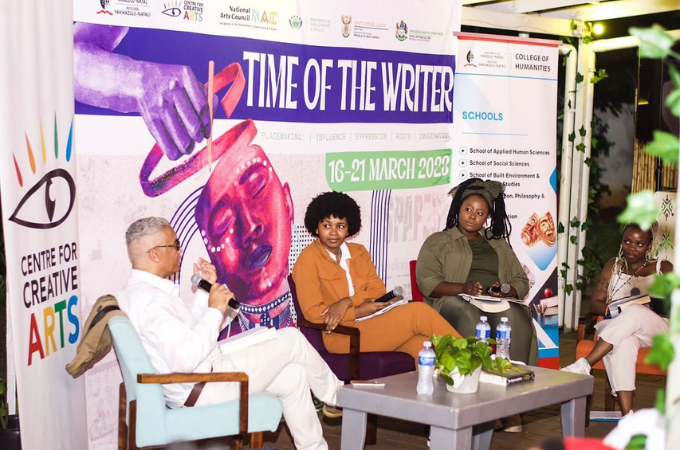
The 26th edition of the Time of the Writer festival was held from March 16–21, 2023 at Alliance Française in Durban, South Africa and online. More than 100 writers, poets, and wordsmiths were involved in the festival and it was a grand success!
Hosted by the Centre for Creative Arts at the University of KwaZulu-Natal, the Time of the Writer festival is held annually to celebrate the creativity of South African writers and discuss important topics including the state of the nation. It is also a chance for young and emerging writers to submit their work to the short story competition to potentially get published in an anthology.
The theme for the 2023 Time of the Writer festival was “Placemaking: Roots, Influence, Imagination and Expression”. The program included a range of live events and online webinars hosted by South African writers and scholars. The all-women curatorial team, led by Sibahle Khwela, pulled together an impressive line-up of writers including Sindiwe Magona, Fred Khumalo, Niq Mhlongo, Zukiswa Wanner, Siphiwo Mahala, Makhosazana Xaba, and more.
Livestreams from the festival are available on the Time of the Writer YouTube page.
Day 1 – March 16
Day One started off with an official opening that included a short overview of the festival, followed by an online panel discussion on “Rooted Legacy of Women in History” and an online discussion on her new book Noni Jabavu: A Stranger at Home by Makhosazana Xaba.
The final event for the day was a live conversation between Dr Sindiwe Magona and Zukiswa Wanner. See the stunning photos below:
Day 2 – March 17
Day Two was a packed day with four online sessions and two live sessions at Alliance Française in Durban.
First, Professor Pamela Nichols, Kgaogelo Lekota, Lerato Seohatse guided the audience in the Wits University Online Writing Workshop 1: Whisperers. Then, Zukiswa Wanner conversed with Siphiwo Mahala on her new biography Can Themba: The Making and Breaking of the Intellectual Tsotsi.
The “Feminist Perspectives” panel involved an inspiring discussion featuring Benita Moolman, Nadia Sanger, and Nadine Dirks, Oksana Lutsyshyna and facilitated by Ayesha Kajee.
The webinar “Queer Representation in Literature” engaged with Welcome Mandla Lishivha’s Boy on the Run (2022) and It Doesn’t Have to Be this Way (2022) by Alistair Mackay. Facilitator Letlhogonolo Mokgoroane was in conversation with the two authors as they shared their thoughts on how queer literature can provide a home for those who stray from what is ‘normalised’.
See photos below:
Day 3 – March 18
Day Three was yet another busy day, focusing on South African politics and crime. It started off with the Wits University Online Workshop 2: Tracing Memory, facilitated by Fouad Asfour and Philiswa Lila, followed by a discussion with poet and language tutor Gloria Mngadi who teaches English and isiZulu to children through WhatsApp.
In the online webinar “Powerless”, investigative journalist Kyle Cowan discussed his book Sabotage: Eskom under Siege (2022) and uncovered the power struggles that threaten the country’s survival. Political commentator Ebrahim Fakir, the Director of Programmes at the Auwal Socio-Economic Research Institute (ASRI), facilitated this conversation with Cowan about the assault on South Africa’s power grid.
Then, Sihle Khumalo reflects on the past and ponders the future of his captivating yet complex country when discussing his new book Milk: The Beloved Country (2023).
See the photos below:
The final event was a discussion of the exciting nonfiction book The Unaccountables (2022), where authors from the social justice organization Open Secrets – Luvano Ntuli, Abby May, and Zen Mathe – made public some necessary secrets:
Day 4 – March 19
Day Four started off with another Wits University Writing Workshop, this time on the topic of “Writing People in Place: Ethnographic Fiction.”
Sipho Sithole discussed his new book Maye! Maye! The history and heritage of Kwa Mai Mai Market (2023) with Hombakazi Mercy Nqandeka on “Cultural Memory Re-imagined.” The book “tells a story of a people’s culture, wrapped in beautiful memories of life in villages left behind but collectively remembered by those who refuse to forget, lest they lose themselves in the concrete jungle that knows no mercy.”
In the moving “Writing through Grief” webinar, four authors exchanged their writing experiences involving grief. Kumi Naidoo talked about his mother committing suicide when he was only 15 years old and how he penned his story in his memoir Letters to My Mother. Yewande Omotoso discussed writing a story about a mother losing her daughter in An Unusual Grief. Henry Blumberg mentioned his memoir about his son’s suicide Sean Left Quietly. Bruce Little wrote Bye Bye Babzoo, We Miss You, a book to guide young children, specifically his nieces, on how to deal with grief.
The “Fiction Expression” discussion featured Fred Khumalo, Niq Mhlongo, and was facilitated by Siphiwo Mahala. See photos below:
The live session “The South African Contemporary Dating Scene” included an interesting panel ofexpert authors, who have all released books which explore romance and dating. They shared their perspectives on how to navigate the modern dating scene in South Africa:
Day 5 – March 20
Day Five was an all-online day of events. It started off with a session on the Joburg Literary Site-specific Theatre Project, started in October 2022 with a competition for new short-form sets in Johannesburg. This session brought together the artists and researchers involved in this public-art-research-archive to discuss how it uses creative writing and theatre as participatory processes to explore everyday experiences of the city.
In the “Sports and Politics” webinar, Buntu Siwisa discussed his book on Daniel Dumile Qeqe (1929–2005), in which he explores how the rugby player helped shape the history of Port Elizabeth, and Saleem Badat talked about his book on the first non-racial international tennis tour. The duo explored how sports can influence diplomatic, social and political relations, facilitated by Goolam Vahed.
The “Toni Morrison and/in Africa and its Diaspora” panel marked the 30th anniversary of Morrison winning the Nobel Prize for Literature. This session examined her continuing legacy to Africa and its diaspora focusing on the confluences between literary practice, the creative arts and scholarship in Morrison’s career.
Nondumiso Lwazi Msimanga also presented a staged reading in honor of Toni Morrison’s literary legacy and her work in excavating slave memory. See her gorgeous performance below:
Day 6 – March 21
The final day, Day 6, was a celebration of slam poetry in honor of International Poetry Day.
World Poetry Slam Champion Xabiso Vili took the stage and graced the audience with inspiring words. Writer and researcher Ongezwa Mbele, and poets and slam champions Busisiwe Mahlangu and Xabiso Vili had a conversation with poet and researcher Dr Raphael d’Abdon on the healing powers of slam poetry.
See photos below:
***
The 2023 Time of the Writer Festival helped writers to engage with their audiences and promoted a deeper understanding of literature and its importance in society. All livestreams from the festival are available here.
Make sure to attend the festival next year if you can! The dates are 14–21 March, 2024. The theme will be Narrative Power: Reignited, Revitalised & Reimagined.



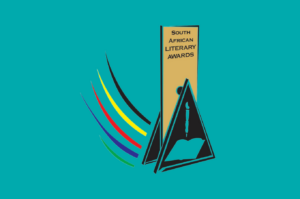
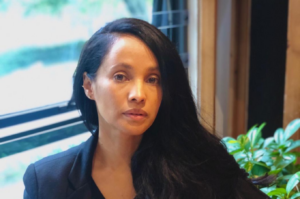
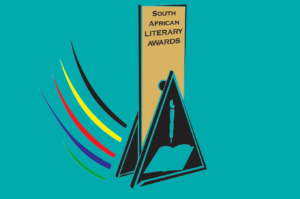
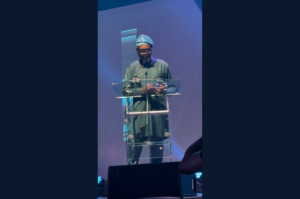


COMMENTS -
Reader Interactions